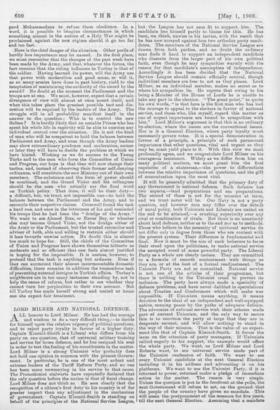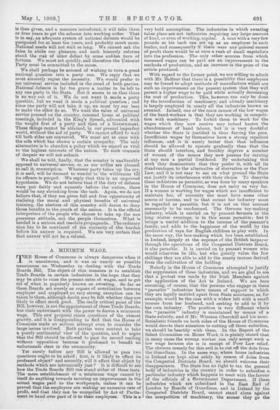LORD MILNER AND NATIONAL DEFENCE. A LL honour to Lord Milner.
He has had the courage and. wisdom to do a very difficult thing,—to decide for himself upon the relative urgency of political questions, and to reject party loyalty in favour of a higher duty. Captain Kincaid-Smith is a Liberal who differs from his party on one question, that of universal military training and service for home defence, and he has resigned hie seat in order to test the feeling of his constituents in the matter. Lord Milner is a strong Unionist who probably does not hold one opinion in common with the present Govern- ment. In particular, he is one of the most ardent and extreme leaders of the Tariff Reform Party, and no one has been more unwearying in his service to that cause. The Protectionist stalwarts have repeatedly declared that the only question before the nation is that of fiscal change. Lord Milner does not think so. He sees clearly that the recognition of a citizen's first duty to his country is of far kreater import than any adjustment in the mechanism of government. Captain Kincaid-Smith is standing on behalf of the principles of the National Service League, but the League has not seen fit to support him. The candidate has himself partly to blame for this. He has been we think, unwise in his tactics, with the result that he has now arrayed against him two orthodox party candi- dates. The members of the National Service League are drawn from both parties, and no doubt the ordinary roan finds it hard to support an independent candidate who dissents from the larger part of his own political faith, even though he may sympathise warmly with the reason for that candidate's assumption of independence. Accordingly it has been decided that the National Service League should remain officially neutral, though individual members are free to act as they please. Lord Milner, as an individual member, makes no secret as to where his sympathies lie. He regrets that owing to his being a Member of the House of Lords he is unable to take any part in the election. "The great point," to quote his own words, "is that here is the first man who has had the courage to appeal to the electors in favour of national service, and those who, like myself, regard this matter as one of urgent importance are bound to sympathise with him." Lord Milner's argument is that this is no ordinary by-election, where the issues are the conventional issues. Nor is it a General Election, where party loyalty must necessarily govern votes. It is a special demonstration in. favour of a principle, a principle of such paramount importance that other questions,. vital and urgent as they may be, must yield place to it. With this view we most profoundly agree, and we congratulate Lord Milner on his courageous insistence. Widely as we differ from him on many political matters, we must grant him the first requisites of a statesman,—the power to differentiate between the relative importance of questions, and the gift of concentration upon the most vital.
It will be generally admitted that the primary duty of any Government is national defence. Such defence has two aspects,—laud preparations and sea preparations. The second of these is not for the moment at issue, and we trust; never will be. Our Navy is not a party question, and however men may differ over the details of naval policy, both Unionists and Liberals are united on the end to be attained,—a crushing superiority over any rival or combination of rivals. But there is no unanimity about land defence, neither as to the end nor as to methods. Those who believe in the necessity of universal service do not differ only in degree from those who are content with the present system. Their difference is fundamental and final. Now it must be the aim of such believers to force their creed upon the politicians, to make national service the accepted creed of some powerful party. The Liberal Party as a whole are clearly useless. They are committed to a formula of smooth contentment with things as they are, or at the best of a formal readjustment. The Unionist Party are .not so committed. National service is not one of the articles of their programme, but there is nothing in the Unionist creed to prevent its inclusion. The party have always made a speciality of defence problems, and have never dabbled in speculations about Treaties and Conferences which will make war impossible. If Unionism means anything, it means devotion to the ideal of an independent and well-equipped nation, ensuing peace by. the paths of adequate .defence. The advocates of national service wish their scheme made part of current Unionism, and the only way to secure this is to convince the party at large that they are in desperate earnest, and will allow nothing to stand in the way of their mission. That is the value of an experi- ment like that of Captain Kincaid-Smith. It forces the issue on the attention of party managers. If Unionists rallied eagerly to his support, the example would affect the whole party. We want, as Lord Milner and Lord Roberts want, to see universal service made part of the Unionist confession of faith. We want to see every Unionist candidate at the next General Election including it in his address and advocating it on his platforms. We want to see the Unionist Party, if it is returned to power, returned under a pledge of immediate action in the matter. The reason is very • simple. Unless the question is put in the forefront at the polls, the next Government will refuse to act, on the .ground that the people of the country have given .no mandate. This will mean the postponement of the measure for five years, till the next General Election. Assuming that a mandate is then given, and a measure introduced, it will take three or four years to get the scheme into working order. That is to say, an adequate system of national defence would be postponed for at least ten years, and probably much more. National needs Will not wait so long. We cannot ask the fates to abide our pleasure, and such leisurely reforms stand the risk of utter defeat by some sudden turn of fortune. We must act quickly, and therefore the Unionist Party must be committed to tile cause.
We shall perhaps be accused of wishing to turn a great national question into a party one, We reply that .we most sincerely regret the necessity. We would prefer to see universal service included in the creed of both parties. National defence is far too grave a matter to be left to any one party in the State. But it seems to us that there is no way out of it. We do not want it made a party question, but we want it made a political question ; and since one party will not take it up, we must try our best to make the other do so. We want the value of universal service pressed on the country, rammed home at political ineetings, included in the King's Speech, advocated with the weight first of a party and then of a Government. These things cannot be attained, in our present imperfect world, without the aid of party. We cannot afford to wait till both sides are converted. We must act at once with the side which has shown a certain sympathy. The only alternative is to abandon a policy which we regard as vital to the highest interests of the nation. To such counsels of despair we will not submit.
We shall be told, finally, that the country is unalterably opposed to universal service, or, as our critics are pleased to call it, conscription. Whatever party takes up the cry, it is said, will be doomed to wander in the wilderness till its offence is purged. We reply that this is an unproved hypothesis. We do not believe that if the duty of defence were put fairly and squarely before the nation, there would be any shrinking from the task. Again, we do not believe that, if they are given full and free opportunity of realising the moral and physical benefits of universal training, the electors of this country will desire to deny those benefits to the youth of the nation. It is the official interpreters of the people who choose to take up the non .possunms attitude, not the people themselves. What is needed is a serious and resolute propaganda. The ordinary man has to be convinced of the necessity of the burden before his answer is required. We are very certain that that answer will not be a refusal.











































 Previous page
Previous page